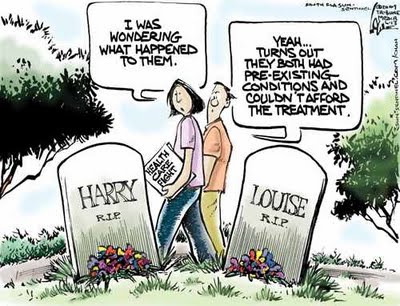
No laughing matter: the growing spectre of euthanasia.
During the recent debate on the abortion bill here in Ireland we were promised faithfully, indeed even scolded by some proponents of the bill, that it would not open the floodgates to abortion on demand. We were to accept that Ireland would not be like every other country in the world and every other example of restricted abortion laws "evolving" into very liberal abortion laws. After all, isn't Ireland different? Well, personally, if anyone believed the proponents on that point they were very naïve. As experience shows when one step is taken in the direction of the culture of death, one finds oneself quickly pushed into a trolley and plummeted further and further down the road.
And there is no better example of this than the progress of euthanasia laws in the Low Countries. After hard-case campaigns pleading to allow so-called "mercy killing" on a voluntary basis saw the introduction of limited euthanasia, we soon began to hear of hard cases which required some involuntary "mercy killing", but only in the most extreme cases and after a number of criteria were fulfilled. After all, there is no desire to trivialise this decision.
Well, the trolley is well and truly gone out of all control now. After the voluntary euthanasia for twin men who were facing blindness was carried out to save them from psychological pain, another case has surfaced - a woman who has just become blind has been euthanized. Apart from her blindness, it seems she was perfectly healthy in every other way. Then there was the woman who was euthanized because a sex change operation went wrong. And now the Belgian parliament is about to vote on the question of allowing children decide if they want to be euthanized voluntarily. We do not allow children marry, vote, drive or drink, but it seems Belgium may well let them decide whether they want to live or die. Things have gone too far, death has been trivialised and is now, in some places, in the service of the health industry.
This disturbing development raises many questions, one of which is: when it will become a duty to die should a person develop an illness that requires continuous care or one which will require a major transformation in one's life like blindness? Given that some of the above persons were euthanized because of mental anguish or associated conditions, could we see a time when people diagnosed with mental illnesses will be expected to die rather than suffer and battle the condition? Or, as the above cartoon suggests, if people cannot afford medical treatment would they be better off being euthanized? Or even more disturbingly: as populations age and fewer are being born to replace and support them, thanks to contraception and abortion, will governmental economic problems see pressure eventually being put on the more needy of elderly citizens to make a decision to end it all in order not to be a burden on society and the economy?
No comments:
Post a Comment